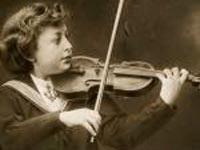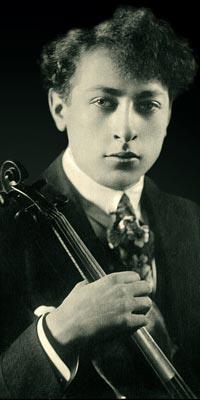Speaking from experience, it's not often that a critic of any sort can cause even a tremor. Forget moving a mountain. Yet, in the case of one of the most gifted musicians in modern history, it was a bad review that turned not just the head, but the entire life of Jascha Heifetz from a young man who was learning to play like a boy to a virtuoso whose skills almost surely will be admired many years.
PBS's always-excellent American Masters series does a fine job of profiling a gifted and very complex man in "Jascha Heifetz: God's Fiddler." (8 p.m. ET Thursday; check local listings.)

Heifetz was born in 1901 in a small Lithuanian town, then part of Russia. He died in 1987, a Californian with homes in Malibu and Beverly Hills. His career was golden. In addition to his super stardom as a violinist, his Hollywood existence landed him in a movie, led him to write a Bing Crosby hit and brought him to a first marriage, with a movie star. Because the program is told from Heifetz’s writings and from recollections of those who knew him, the materials' provenance is near flawless. So much detail about this huge talent is packed into a relatively small hour, yet one leaves with a clear idea of and new respect for such a singular musical genius.
He played in public for the first time at the age of 5; four years later, he was admitted to a prestigious conservatory in St. Petersburg, Russia, where only the intervention of Leopold Auer, a Russian musical giant at the time, kept him from being barred because of his Jewish heritage; at 11 he played his first solo concert, and after building a reputation throughout Russia and Europe by the time he reached 17, he left for what was supposed to be a four-month tour of the United States. The overthrow of the Russian monarchy turned that into a much longer stay and, eventually, U.S. citizenship.
 He was an immediate celebrity, and as more of America discovered him, he had -- for him -- unprecedented fun as he discovered a life that was far better than the one he had left in Russia.
He was an immediate celebrity, and as more of America discovered him, he had -- for him -- unprecedented fun as he discovered a life that was far better than the one he had left in Russia.
"After I came to America, my one aim, it seems, was to enjoy myself," he wrote. "I had to wait until I was a young man before I could act like a child."
The end to that spree came when W.J. Henderson, a respected New York music critic, wrote in a scathing review of a Heifetz performance that he seemed "content to stand still" and not progress his art.
"Nothing had prepared me for a bad review," Heifetz wrote.
An associate from later in his life tells how Heifetz considered suicide. Instead of ending his life, he changed it radically, returning to serious practice and rehearsal again. He never turned his eyes from that intense discipline for the remainder of his professional life.
The change spilled over into almost all parts of his life. His second marriage ended as unsuccessfully as the first. His decades-long lawyer said of the children from those marriages, "He didn't care for any one of the three of them."
Heifetz taught master classes at the University of Southern California. Some students were unable to take the master's stern nature and abandoned the course. Those who stayed experienced a "tense" unbalance between his demeanor out of the teaching environment and the strict formality within. His performances were labeled by some as impassive and cold. It's pointed out that very few people were allowed to call him by his first name; "Mr. H" was the more common appellation. Reversing his earlier love for celebrity, he traveled under the name Jim Hoyl. It was the same pseudonym he used as the composer of the Crosby recording -- “When You Make Love To Me (Don’t Make Believe”).
It appears all the adulation made him incredibly complex. When he was still a child, his Russian benefactor, Auer, announced, "He's not my student. He's a student of God."
The continuing overawed reaction of Itzhak Perlman to encounters with Heifetz sums up how this most-serious man was almost religiously respected by those he touched:
"I can't believe I'm actually talking to God!"
--
Tom Brinkmoeller wrote about broadcasting for The Cincinnati Enquirer in the '70s and '80s and has continued to do so whenever he's had the opportunity. He writes about public television in his "Public Decency" blog.